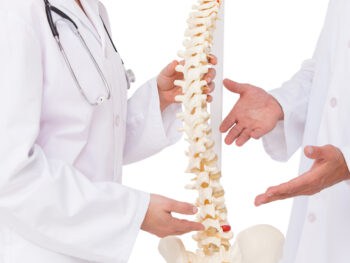Doctors are torn at times about the use of diagnostic testing shortly after an injury occurs.
Physicians of course want to rule out internal derangement before they start the patient on a treatment path. Early physical therapy could do more damage than good should internal derangement be present.
The flip side to that statement is if the objective indicators are not present, and the testing is completed, it can validate the “injury” in the mind of the claimant.
Adjusters Are Often Put In Tough Position to Approve Testing
Adjusters are often put in a tough position on whether or not to approve testing just after an injury. The claim is new, the adjuster has limited info, and doctors are usually not helpful in putting the pieces of the puzzle together.
Patients are also are very demanding. The presence of medical websites can impact a claim, and injured workers are not stupid. They know what to tell the doctor in order to get what they want. This is especially true in states where the carrier cannot direct care and the worker is free to treat with any doctor they choose. The doctor chosen is likely their primary care doc, who they have known for years, and can probably request whatever they want and usually get it from them.
Click Link to Access Free PDF Download
“The 6-Step Process To Determine Workers’ Comp Injury Causation”
Take the normal every day back strain injury. The worker lifts up a box and feels pain in their lower back. Upon examination, the patient has tenderness, pain, and limited range of motion. They complain of acute pain, and they are demanding an MRI be completed.
This is the proverbial fork in the road. If the patient has delayed reflex, subjective radicular pain in the legs, and subjective numbness, the doctor at times will be quick to grant the request of an MRI.
Why Is Conservative Treatment Not Applied First?
I do not agree with this stance. If the injury just happened, why is conservative treatment not applied first? Medication, work restrictions, and maybe conservative physical therapy should be completed first prior to any diagnostic testing being completed except the normal X-Rays.
From the adjuster point of view, if the MRI is approved and completed, you know what is going to happen: A lumbar spine MRI of a 50-year-old factory worker can show everything under the sun. This includes multilevel disc bulges, possible small disc herniations, and probably some extent of degenerative disc disease. If the doctor goes over this MRI with the patient and this is the first MRI the patient has ever had, the worker is going to tag all of these issues as being related to their work injury. Without prior MRI films to compare, physicians will likely agree that something in that MRI is related to the work injury, even though there is no way to prove that.
Without prior MRI films, you have no way to show what is related to this injury and what is not. Personally, I prefer an EMG before and MRI. If this EMG is negative, there is no need for an MRI. However, even if the EMG is slightly positive for a radicular component, there is again no way to correlate those findings back to a work injury. For all the adjuster or doctor knows this worker could have had leg pain for years prior to this issue and never had prior treatment.
I also see a correlation between the personal health plan the worker has and the increased demands for diagnostics and invasive injections along with narcotic medications. The higher the deductible the worker has in their health plan, the more they will push for work comp to cover as much treatment as possible. Why? Because in work comp there is no out of pocket deductible for the claimant.
People are not stupid. An MRI might cost them $250 in a co-pay fee if they were to get it on their own. $250 they can’t afford to spend. So if they have had back pain outside of work for years, then injure themselves at work, of course they are going to want the MRI because it is going to tell them what is wrong, if anything.
I don’t have a study to reference that backs this up, but I believe the correlation is there to show that the earlier diagnostics are completed, the longer work comp claims are around. Adjusters have to remember that most workers do not have the medical training and experience that adjusters have. If they hear “disc herniation” from a doctor, they are going to immediately correlate it to their work injury, and fast forward to the ideation that they need lumbar surgery. In their minds they have already made the decision that nothing else will help them. The common statement of “Well I had no back pain prior to this back injury at work” is more common than anything else, and this can apply to whatever body part is injured. Only the worker knows if this is true or not.
If a worker has a high deductible plan, the last thing that they want to do is spend their money on a medical workup should they have a non-occupational injury. Their mindset is that whatever pain they have they are not going to treat until they have to. That’s because it costs them so much in out of pocket fees, and maybe they just cannot afford it because of other financial demands.
Review Personal Medical Plan Outline of Injured Worker
A good idea for adjusters and employers as part of an investigation is to review the personal medical plan outline for this injured worker. Are they on a high-deductible plan? Do they have really high co-pays? Have they been out of work on personal medical leaves for anything within the last 5-7 years? If so, what did that entail?
Also helpful are medical sweeps completed by an outside vendor. If the vendor discovers that this claimant has had numerous prescriptions filled at a local pharmacy, who was the prescribing doctor? Once you get that info, you can obtain a signed medical authorization from the claimant and get those records from that doctor to confirm if they have had prior back or neck strains they may have treated that could impact this current claim.
Probably 8 times out of 10, injured workers will tell their adjuster they have had no back pain in the past, and then a medical sweep will confirm otherwise. A medical sweep should be a staple in the investigation process for the adjuster. Taking what injured workers tell the adjuster on face value is not enough information. Completing a full and thorough medical investigation will be what determines if a claim is accepted or not.
Most states make aggravation or exacerbation of a pre-existing condition compensable under workers comp. The problem lies with what treatment the adjuster is forced to approve, and what can be fought. If a patient is pushing for an MRI right away, this should be a red flag. What do they know about an MRI? Why would they want one completed? More importantly why does the doctor want to complete the MRI? Is it only to appease their patient? Or perhaps there are clinical objective findings to support the need for the testing sooner versus later after a conservative treatment has been completed.
Whatever the case may be, I feel that the earlier the MRI is completed, the more trouble the adjuster is going to have with that claim. A troublesome claimant means that claim is not going to go anywhere soon.
Employers and adjusters have to remain vigilant in every file, every day. Failure to do so is going to mean wasted claims dollars, and perhaps a file being deemed compensable in error.
Author Michael B. Stack, Principal, COMPClub, Amaxx Work Comp Solutions. He is an expert in employer communication systems and helps employers reduce their workers comp costs by 20% to 50%. He resides in the Boston area and works as a Qualified Loss Management Program provider working with high experience modification factor companies in the Massachusetts State Risk Pool. He is co-author of the #1 selling book on cost containment, Your Ultimate Guide To Mastering Workers Comp Costs www.reduceyourworkerscomp.com, and Founder of the interactive Workers’ Comp Training platform COMPClub. Contact: [email protected].
©2015 Amaxx LLC. All rights reserved under International Copyright Law.
SALES TO PAY FOR ACCIDENTS CALCULATOR: http://reduceyourworkerscomp.com/sales-to-pay-for-accidents-calculator/
WC GROUP: http://www.linkedin.com/groups?homeNewMember=&gid=1922050/
WORKERS’ COMP TRAINING: https://workerscompclub.com
Do not use this information without independent verification. All state laws vary. You should consult with your insurance broker, attorney, or qualified professional.












